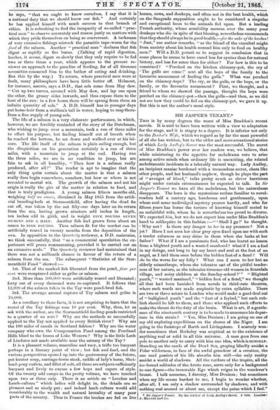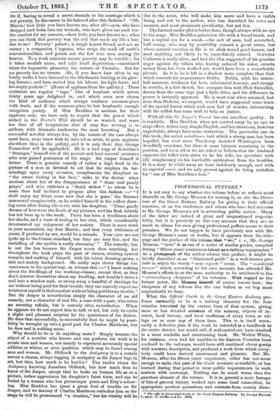SIR JASPER'S TENANT.* Tars is by many degrees the worst
of Miss Braddon's recent novels. It is said to have been written with a view to adaptation for the stage, and it is stagey to a degree. It is inferior not only to the Doctor's Wife, which we regard as by far the most powerful of all she has written, but to the older and more sensational stories of which Lady A tulley's Secret was the most successful. The secret of Miss Braddon's power over her readers was, we believe, that while ministering to the appetite for melodrama sure to arise among active minds when ordinary life is unexciting, she related melodramatic incidents in a tolerably natural way. Lady Audley, an incipient maniac burdened with a tremendous secret, chats like other people, and her husband's nephew, though he plays the part of " avenger of blood," talks pretty much as clever barristers might under certain circumstances be expected to talk. In Sir Jasper's Tenant we have all the melodrama, but the naturalness disappears. The hero is the mysterious recluse familiar to novel- readers half a century ago, handsome and gentlemanly, upon whose soul some undivulged mystery presses hardly, and who for fifteen years has borne the torture of knowing himself mated to an unfaithful wife, whom he is nevertheless too proud to divorce. We expected him, but we do not expect him under Miss Braddon's hand to soliloquize in this fashion :—" ' Shall I ge ?' he thought.
Why not? Is there any danger to her in my presence? Not a jot ? Have I not seen her clear grey eyes fixed upon me with such a tender calmness as may shine in them when she looks at her father? What if I am a passionate fool, who has learnt no lesson from a blighted youth and a wasted manhood? what if I am a fool in my dotage, and long to lay my heart and soul at the feet of an angel, as I laid them once before the hidden foot of a fiend? Will she be the worse for my folly ? What can I seem to her but an elderly misanthrope, whom she tolerates out of the pitiful tender- ness of her nature, as she tolerates tiresome old women in Scarsdale village, and noisy children at the Sunday-school ?' " " Blighted youth," " wasted manhood," " hidden foot of a fiend," we thought all that had been banished from novels to third-rate theatres, where such words are made emphatic by extra syllables. There are two or three actors in London who would make a good deal out of " bullighted youth " and the " foot of a feyind," but such rub- bish should be left to them, and those who applaud such efforts to make the throat do the duty of the brain. What is art, if a gentle- man of the nineteenth century is to be made to announce his depar- ture in this strain? " Yes, Miss Denison ; I am going on one of my old exploring expeditions on the shores of the Niger. I am going in the footsteps of Barth and Livingstone. I scarcely won- der sometimes that Berkeley was sceptical as to the existence of anything real or solid in all this universe. A man goes from one pole to another only to carry with him one idea, which is HIMSELF. Standing on the sands of the Dead Sea, groping blindly amidst a Polar wilderness, in face of the awful grandeur of a creation, the one mad passion of his, life absorbs him still—the only reality amidst a world of shadows. AU the verdure of the tropics, all the ice-bound solitudes of the Arctic zone, serve only for a background to one figure—the inexorable Ego which reigns in the wanderer's breast. I talk nonsense, I daresay, Miss Denison ; but sometimes when my life seems hardest to me, I begin to wonder whether, after all, I am only a shadow surrounded by shadows, and with nothing real around or about me, except the pains which I feel."
• Sir Jasper's Tenant. By the Author of Lady dudirey's Secret. 3 vole. Louden; J. Maxwell and Co. Or if, having to reveal a secret obstacle to his marriage which is not poverty, he discourses to his beloved after this fashion? "Oh, Marcia! how little you have known me, after all 1—you, who have dropped such balm into my wounds, who have given me such ten- der comfort for my sorrows,—how little you have known me, when you can think that poverty was the evil that made my life a bur- den to me! Poverty! pshaw ; a rough honest friend, and not an enemy ; a companion 1 iogenes, who strips the mask off earth's conventionalities, and points out the few true men among the knaves. To a weak sensuous nature poverty may be terrible ; for it takes another name, and calls itself deprivation—unsatiated thirst for impossible pleasures, the torture of Tantalus. But for me poverty has no terrors. Ah, if you knew haw often in my lonely walks I have listened to the blacksmith beating at his glow- ing furnace, and have envied him his labour, his light heart, and his empty pockets !" (Roars of applause from the gallery.) Those sentences are regular " tags," bits of bombast which actors thirty years ago delighted in, and which even now charm the kind of audience which always confuses common-place with truth, and if the common-place be but bombastic enough recognizes poetry. If Miss Braddou is anxious for their applause only, we have only to regret that the power which etched in the Dactor's Wife should be so wasted, and warn her that of all temptations that of easy fine writing is to authors with dramatic tendencies the most besetting. But a successful novelist always has, by the nature of the case always must have, some inner wish to succ2ed as artist, to gain applause elsewhere than in the gallery, and it is only there that George Pauncefort will be applauded. He is a bad copy of Kotzebue's " Stranger," himself one of the poorest and least natural creatures who ever gained possession of the stage. Sir Jasper himself is better. There is genuine comedy of rather a high kind in the picture of a man so devoted to art that he employs its ter- minology upon every occasion, compliments his daughter on " the sweet feeling in her face," talks to the doctor when anxious about her of the disappearance of " those cool pearly grays," and who criticizes a "florid widow " to whom he is more than half inclined to propose after this fashion :-1 " I shall enjoy my Ettys more now that she is gone,' the Baronet murmured complacently, as he settled himself in the yellow draw- ing-room after dining tete-a-tete with his daughter. ' Those gaudy dresses of hers were the death of my pictures, and her flesh latterly has not been up to the mark. There has been a woolliness about her cheeks, and a want of feeling in her chin, which considerably deteriorated my enjoyment of her society. There is more truth in your mezzotints, my dear Marcia ; and that ivory whiteness of yours, if produced by art, would be a miracle. Your eyes are not quite up to the Greuze standard, but they are very fine, and the modelling of the eyelids is really charming.' " The comedy, too, is not the less because Sir Jasper never doss anything, but throughout the book plays the part of chorus, uttering cynical remarks and making of himself, with his velvet dressing-gown, a rich and stately background. He really says clever things too, sometimes in his cynical way, as witness this :—" I know nothing about the dwellings of the working-classes ; except that, as they don't interest themselves about my dwelling, and wouldn't drive a nail into a window-sash, or sweep away a handful of shavings for me without being paid for their trouble, they can scarcely expect me to interest myself in their comfort without being paid for my trouble." But Sir Jasper is nevertheless simply the character of an old comedy, not a character of real life, a man with a part, who utters an amusing refrain, but is scarcely alive nevertheless. When he appears we do not expect him to talk or act, but only to excite a slight and pleasant surprise by the quaintness of his dialect. He does that successfully, so successfully that he might by possi- bility be wrought up into a good part for Charles Matthews, but he does and is nothing more.
Why should he be or do anything more ? Simply because the object of a novelist who knows and can perform his work is to create men and women, not merely to represent accurately special oddities or whims, or even qualities, which may be found among men and women. Mr. Oldbuck in the Antiquary is to a certain extent a chorus, always lugging in antiquity as Sir Jasper lugs in art, but then how much is he besides? The reader closes the Antiquary knowing Jonathan Oldbuck, but how much does he know of Sir Jasper, except that he looks on human life as on a picture, rather appreciates his daughter's faint tints, and can be fooled by a woman who has picturesque, poses and Etty's colour- ing. Miss Braddon has spent a great deal of trouble on Sir Jasper, and we daresay if Charles Matthews embodies him on the stage he will be pronounced "a creation," but his vitality will be
due to the actor, who will make him move and have a visible being, and not to the author, who has described his voice and manner, and most prominent peculiarity, but not him.
The farcical under-plot is better done, though always with an eye to the stage. Miss Braddon paints low life with a broad brush, and has a capital eye for a sneak,—the sort of man, half scoundrel, half scamp, who may by possibility commit a great crime, but whose natural vocation in life is to slink round good houses, and steal anything not likely to be immediately missed. Gervoise Catheron is really alive, and had the idea suggested of his genuine anger against the villain who, having seduced his sister, extorts money from her, been worked out, would have been a remarkable picture. As it is, he is left in a shadow more complete than that which conceals his acquaintance Dobbs. Dobbs, with his music- hall manners, weakness for bets, substantial honesty, and energy in trouble, is a fair sketch, but compare him with Dick Swiveller, drawn from the same type just a little older, and the difference in power is instantly apparent. He is most real when arrested, but even then Dickens, we suspect, would have suggested some trace of the special horror which such men feel of murder, intermixing with the selfish fear some wish to help on justice.
With all this Sir Jasper's Tenant has one excellent quality. It is readable. Miss Braddon, when not carried away' by an eye to stage effect, writes easy, simple English, and her situations, however improbable, always have some attraction. The particular one in this book, the secret misalliance into which a strong man has been beguiled, has ever since Thackeray sketched Warrington been dreadfully overdone, but there is some interest remaining in the position, and even when we are asked to believe that the husband supposes his wife's twin sister to be his wife, we speculate with idle complacency on his inevitable extrication from his troubles_ Itis a story to while away an hour indolently enough, and with no especial ennui, and we only protest against its being mistaken for " one of Ali s Braddon's best."































 Previous page
Previous page